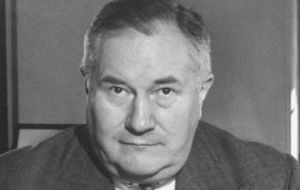MercoPress. South Atlantic News Agency
A US diplomat and lobbyist who helped carve recent Latinamerican history
 US ambassador Spruille Braden
US ambassador Spruille Braden Argentine president Cristina Fernandez de Kirchner surfaced this week the name of a former US ambassador, and US corporation lobbyist, linked to notorious events of Latinamerican history of the last century at a ceremony in Government House.
The ceremony was dedicated to the definitive peace and limits agreement between Bolivia and Paraguay, sealing the end of the Chaco war (1932/35) which cost over a million lives and had Argentina as one of the country guarantors of the 1938 peace agreement.
The Chaco War was fought between neighboring and landlocked Bolivia and Paraguay over control of a great part of the sparsely populated Gran Chaco, which was incorrectly thought to be rich in oil.
Foreign oil companies were involved in hydrocarbons exploration in the area: companies mainly descended from Standard Oil, backed Bolivia, while Shell Oil supported Paraguay. Standard Oil was already producing oil from wells in the high hills of eastern Bolivia.
And the man in question is Spruille Braden, US ambassador, businessman, lobbyist, member of the Council of Foreign Relations. He served as the ambassador of various Latinamerican countries, and as Assistant Secretary of State for Western Hemispheric Affairs. He is described as “notable” for “his interventionist activities and his prominent role in several coups d’état.
Braden with a Yale degree in mining first came to prominence as one of the owners of the Braden Copper Company in Chile and as shareholder in the United Fruit Company.
He also directed the W. Averell Harriman Securities Corporation and as “an agent of Standard Oil played a role in the Chaco War, between Bolivia and Paraguay”.
Standard found oil in eastern Bolivia in 1927 and 1928, believing the deposits could extend to the Gran Chaco, an area which Paraguayans loggers and cattle farmers where rapidly moving into. However Shell Oil had exploration rights in Paraguayan Chaco and did not see with the same eyes as the US oil giant.
In his protracted diplomatic career Braden held ambassadorships in Colombia (1939/42), Cuba (1942) and Argentina (1945). But he was notoriously famous during his residence in Argentina actually helping boosting the political chances of a young Army Colonel who would drastically change the country’s history, Juan Domingo Perón.
Braden famously participated in the internal political struggle, organizing the opposition against President Julián O’Farrel and Juan Perón. From the beginning, Braden publicly organized and coordinated the opposition, exacerbating the internal conflict.
Perón exploited his intervention with a slogan, “Braden or Perón”, which contributed to Peron's victory in the presidential election in 1946, and his catapult as the inspiration of Argentina’s strongest political movement which extends to our days.
Braden accused the Peron regime of being pro-Axis, anti-United Nations and of plotting against Allied interests in South America, including the protection of industrial and commercial Axis assets and massive violations of human rights.
The ambassador’s interjection into Argentine politics angered many Argentines and had the unintentional result of increasing popular support for Juan Perón. By the time of the 1946 elections it had come to appear to many Argentines that the choice for president was either for the Argentine Juan Perón or Perón's opposition, whom they perceived as being sponsored and backed by the US ambassador.
Beginning in 1948, Braden was a paid lobbyist for the United Fruit Company with vast interests in Central America. When the company's interests were threatened in Guatemala by President Jacobo Arbenz Guzmán, Braden helped to conceive and execute the 1954 coup d’état that overthrew him.
In March 1951, Árbenz had assumed the presidency after Guatemala's second-ever universal-suffrage election, marking the first peaceful transition of power in the country’s history. He campaigned as a reformer and garnered 60% of the vote by promising to make Guatemala an economically independent, capitalist state that would shed its colonial-era dependence on the US,
Following his overthrow disappointed left wing groups in Latinamerica disenchanted with US sponsored democracy opted for the use of armed struggle to achieve their goals. This happened five years later in Cuba with the triumphant revolution led by Fidel Castro.




Top Comments
Disclaimer & comment rules-

Read all commentsBraden falls in a long line of U.S. ambassadors to Latin America who followed the dictates of big business and not what was in the best interests of the American people. The latest was the Colombian-American boob assigned to La Paz who, because of inappropriate statements, doubled Evo Morales's percentage in opinion polls in the leadup to the 2002 elections (a precursor to his eventual victory in the next election).
May 02nd, 2009 - 12:42 am 0Commenting for this story is now closed.
If you have a Facebook account, become a fan and comment on our Facebook Page!